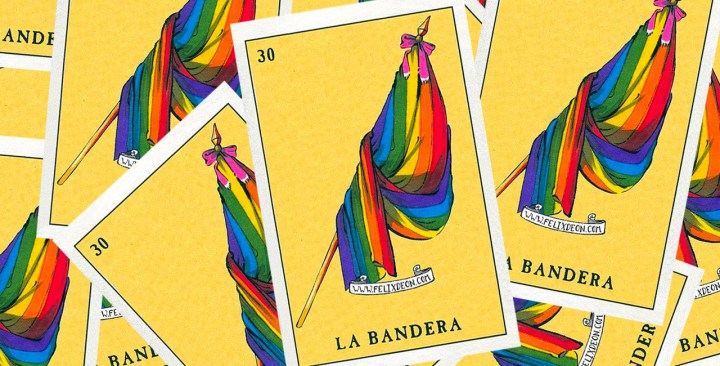Queer Mexican Artist Accused Target of Stealing His Art for Pride T-Shirt

Collage by Alan López for Remezcla
Target offers a considerable graphic T-shirt line, which includes everything from shirts inspired by current TV shows, T-shirts that will fill you with nostalgia, and a Pride line. While it’s important that a major retailer sells LGBTQ items (Target has sold Pride items for about five years), it shouldn’t come at the expense of members of said community. On Tuesday, Mexican artist Felix d’Eon took to Twitter to call out the chain for selling shirts seemingly lifted from his loteria-inspired prints.
RELATED: Queer Artist Felix D’Eon’s Illustrations Are Beautiful Depictions of LGBTQ Love
“Target stole a design of mine and printed it on a T-shirt,” he wrote. “Is this how you support the queer Latinx community, @Target, by stealing the art of a gay Mexican artist? I’m curious to hear what you have to say!”
Along his tweet, he shared images of his La Bandera piece, which features a partially furled LGBTQ flag set against a yellow background. The words “La Bandera” sit below his artwork. The Target version features a similarly positioned flag. The shirt has the words Equalidad emblazoned on it.
Target has responded by pulling the tee from its site. In a tweet to Felix, the site said: “Target respects the design rights of others & expects our vendors to do the same. We’ve removed the shirt from our online assortment & are in contact w/ the vendor. We spent a lot of time selecting Pride merchandise that celebrates the LGBTQ+ & ally community.”
While Target seems intent on righting this wrong, it’s likely the brand will garner some ill will. Big chains have notoriously stolen the designs of indie designers, and gotten away with it. LA artist Tuesday Bassen accused Zara of plagiarism and had her lawyer contact the Spanish fashion brand. Reportedly, the company said the artist had no case because she was just an indie artist, according to Dazed. “Not enough people even know about me for it to matter,” Bassen said.